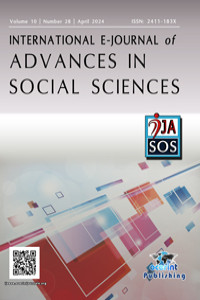Abstract
References
- Bateson, G. (1972). Steps to an ecology of mind. Chandler Publishing Company.
- Bourdieu, P. (1986). Forms of capital. Handbook of Theory and Research for the Sociology of Education, 241:58.
- Castells, M. (1996). Rise of the network society: The information age: Economy, society and culture. Blackwell Publishers.
- Giddens, A. (1984). The Constitution of Society. University of California Press.
- Kolmogorov, A. N. (1965). Three approaches to the quantitative definition of information. Problems of Information Transmission, 1(1).
- Luhmann, N. (1995). Social Systems. Stanford University Press.
- Moiseev, V. D. (1967). The central ideas and philosophical principles of cybernetics. Joint Publications Research Service.
- Petter, S., DeLone, W., and McLean, E. (2008). Measuring information systems success: models, dimensions, measures, and interrelationships. European journal of information systems, 17:236–263.
- Shannon, C. E. (1948). A mathematical theory of communication. Bell System Technical Journal, 27(3).
- Wiener, N. (1948). Cybernetics: Or Control and Communication in the Animal and the Machine. MIT Press, Cambridge, MA.
- Wiener, N. (1950). The Human Use of Human Beings: Cybernetics and Society. Houghton Mifflin, Boston, MA.
Abstract
In the evolving landscape of contemporary societies, the possession and management of information emerge as potent tools shaping power dynamics and societal progress. This work deals with the critical role of information, emphasizing its transformative potential and the challenges associated with its effective utilization.
The exploration begins by highlighting knowledge as a modern form of power, propelling societies towards new opportunities while concurrently addressing pressing social issues. The argument underscores the urgency of understanding information as a social category, essential for influencing phenomena, solving problems, and steering societal developments. Practical application is identified as a key driver, with specialized information system models under development to cater to diverse aspects of social life and work.
The interconnectedness of global progress and the imperative of information, emphasizing the need for collaboration, knowledge exchange, and a universal approach to information dissemination, is a focal point. The challenge of overcoming information concentration, a barrier that perpetuates narrow interests and raises concerns about misuse, is duly deliberated. It is suggested that the solution lies in fostering closer ties between nations, sharing knowledge, and engaging in dialogue to address global issues comprehensively.
We argue that organized information systems, both national and international, are essential for dynamic development. This emphasizes the necessity of a globally coordinated approach. Acknowledging achievements from other nations is essential to avoid redundancy and foster innovation.
Information, in various forms, emerges as the foundational element influencing effective decision-making. Decision-making in complex societal and international landscapes is scrutinized, revealing the indispensable role of information in scientific, technological, and socio-economic progress. The interconnected dimensions of socio-economic development and decision-making are explored, emphasizing the need for objective scientific analyses and a deep understanding of contemporary social processes.
We delve into the ethical dimensions of information handling, highlighting the positive contributions of information to science, technology, and societal relationships. Simultaneously, we address the concerns of information misuse, particularly in the creation and utilization of databases containing extensive citizen data. The challenge of balancing national interests with ethical data handling practices is presented, urging the establishment of universally agreed-upon rules for responsible data management.
This work underscores the ongoing global efforts to harness the potential of information. While acknowledging the positive commitment towards understanding the significance of information, it asserts that the problem is yet to be fully researched and resolved. The failure to grasp the true meaning of information and underutilization of its potential are identified as factors with profoundly negative consequences. Finding effective solutions to ensure that information contributes positively to global progress and the well-being of humanity, remains an open research problem.
Keywords
information management knowledge as power information systems information concentration decision-making ethical dimensions responsible data management underutilization of information potential
References
- Bateson, G. (1972). Steps to an ecology of mind. Chandler Publishing Company.
- Bourdieu, P. (1986). Forms of capital. Handbook of Theory and Research for the Sociology of Education, 241:58.
- Castells, M. (1996). Rise of the network society: The information age: Economy, society and culture. Blackwell Publishers.
- Giddens, A. (1984). The Constitution of Society. University of California Press.
- Kolmogorov, A. N. (1965). Three approaches to the quantitative definition of information. Problems of Information Transmission, 1(1).
- Luhmann, N. (1995). Social Systems. Stanford University Press.
- Moiseev, V. D. (1967). The central ideas and philosophical principles of cybernetics. Joint Publications Research Service.
- Petter, S., DeLone, W., and McLean, E. (2008). Measuring information systems success: models, dimensions, measures, and interrelationships. European journal of information systems, 17:236–263.
- Shannon, C. E. (1948). A mathematical theory of communication. Bell System Technical Journal, 27(3).
- Wiener, N. (1948). Cybernetics: Or Control and Communication in the Animal and the Machine. MIT Press, Cambridge, MA.
- Wiener, N. (1950). The Human Use of Human Beings: Cybernetics and Society. Houghton Mifflin, Boston, MA.
Details
| Primary Language | English |
|---|---|
| Subjects | Sociology of Science and Information |
| Journal Section | Research Article |
| Authors | |
| Early Pub Date | April 20, 2024 |
| Publication Date | May 3, 2024 |
| Submission Date | February 10, 2024 |
| Acceptance Date | March 19, 2024 |
| Published in Issue | Year 2024 Volume: 10 Issue: 28 |
Contact: ijasosjournal@hotmail.com
The IJASOS Journal's site and its metadata are licensed under CC BY
Published and Sponsored by OCERINT International © 2015- 2025

